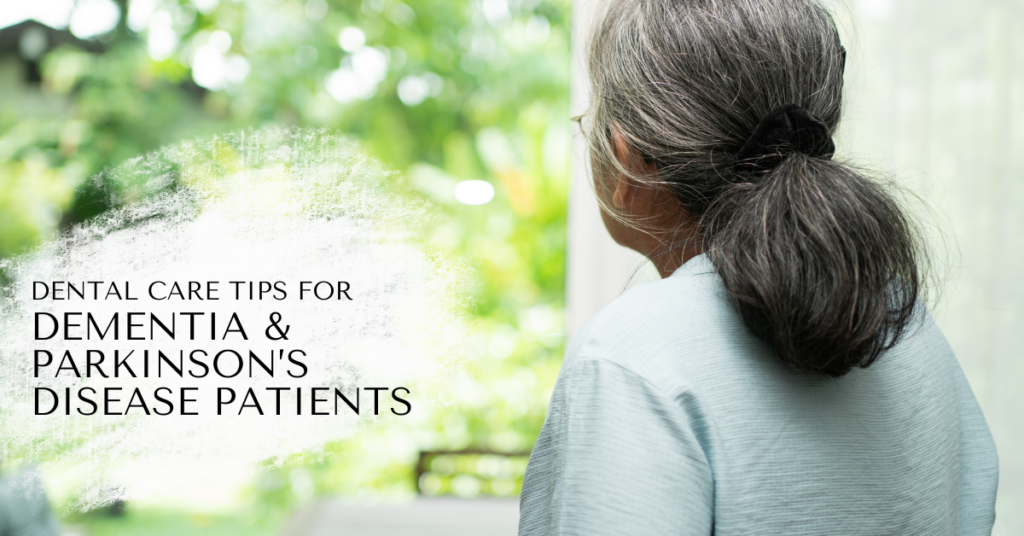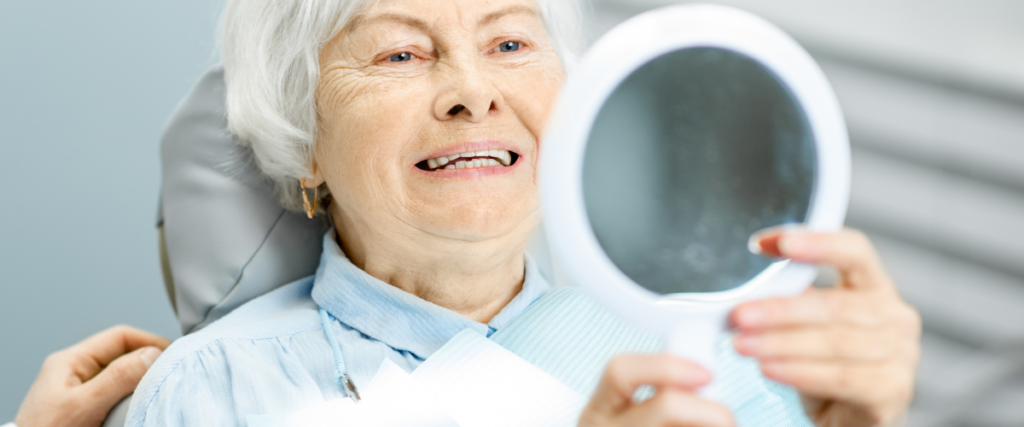Article reviewed by:
Dr Steven Soo • Prosthodontist

Caring for dental health is a vital aspect of overall well-being, yet it presents unique challenges for individuals with dementia and Parkinson’s disease. These conditions can complicate routine oral hygiene and dental visits, making it essential to adopt specialised approaches tailored to their needs.
In this blog post, Dr Steven Soo (Prosthodontist) provides practical tips to help caregivers navigate dental care for individuals with these neurological conditions.
Table of Contents
- Signs of dementia
- Signs of Parkinson’s disease
- What are some unique challenges they face in their dental routine?
- Are there techniques for caregivers to help them maintain good oral hygiene?
- What dental products are particularly helpful for these individuals?
- What are some signs that indicate dental problems in these individuals?
- What are some misconceptions about dental care you would like to address for these individuals?
- What are some examples of effective dental care for these individuals?
Signs of dementia

World Health Organization (WHO) defines dementia as a disease that impairs memory, thinking, and the ability to carry out daily activities. The condition progressively worsens over time, primarily affecting older adults, but not all people will get it as they age.
Some early signs of dementia include:
- forgetting things or recent events
- losing or misplacing items
- getting lost while walking or driving
- feeling confused, even in familiar places
- losing track of time
- difficulty solving problems or making decisions
- struggles to follow conversations or find the right words
- finding it tough to perform day-to-day tasks
- visual misjudgement of distances to objects
Dementia impacts individuals differently based on their health conditions and cognitive functioning before the illness. As the disease progresses, the need for assistance with personal care increases.
People with dementia often struggle to recognise family and friends, experience mobility issues, lose bladder and bowel control, have difficulty eating and drinking, and exhibit behaviour changes such as aggression, which can be distressing for both the person with dementia and those around them.
Signs of Parkinson’s disease

Parkinson’s disease (PD) is a neurological disorder affecting movement, mental health, sleep, pain, and other aspects of health. It progresses gradually without a cure, although therapies and medications can alleviate symptoms.
Some motor symptoms of PD include:
- slow movement
- tremor
- trouble walking
- imbalance
- involuntary movement
- rigidity
Some non-motor symptoms of PD include:
- cognitive impairment
- sensory disturbances
- dementia
- mental health disorders
- sleep disorders
PD often leads to disability and necessitates caregiving. Many individuals with PD also experience dementia. While typically seen in older adults, it can affect younger individuals as well, with men more commonly affected than women.

What are some unique challenges they face in their dental routine?
Since there is no cure for dementia, memory loss can worsen to the extent that simple everyday activities and self-care become forgotten. Caregivers may overlook dental hygiene amidst other responsibilities such as managing medications, meals, and doctor appointments. As a result, dental care is often not prioritised.
Dementia primarily affects the elderly, who are more likely to have fewer natural teeth and may rely on dentures or bridges. This can compromise chewing function, leading to a preference for softer, more easily chewed foods that are often high in fermentable carbohydrates.
Inadequate dental hygiene combined with an unhealthy diet can result in root caries, causing pain and potential infections in the mouth. Individuals with dementia may also misplace dentures and forget how to properly brush their teeth.
For individuals with PD, these physical barriers make dental care challenging for them:
- Tremors may cause difficulty in their daily oral hygiene routine.
- A weakened swallowing ability can elevate the risk of choking during treatment.
- A dry mouth may be experienced, increasing the risk of cavities and adding to chewing difficulties or denture discomfort.

Are there techniques for caregivers to help them maintain good oral hygiene?
Proper dental care is crucial for individuals with Alzheimer’s or other forms of dementia. It helps prevent issues such as mouth infections, digestion problems, and the need for complex dental procedures in the future. As dementia progresses, dental visits can become challenging because the individual may not understand what is happening and may resist the treatment.
Over time, the person might forget how or why they need to brush their teeth. As a caregiver, you may need to provide assistance or take a more hands-on approach.
Here are some tips that might help:
- Provide oral hygiene instructions in a series of simple steps – similar to teaching a child. Demonstrate brushing side by side can be helpful.
- Select the right toothbrush – one with soft bristles and long handles. Electric toothbrushes are also beneficial for individuals with limited hand mobility or coordination because they only require guiding of the toothbrush along the teeth and gums, making them much easier to use.
- Speak with the person’s dentist – Share about the illness they have, and assist the person to keep up with bi-annual dental visits.
- Signs of mouth pain – If there are indications that the individual is refusing to eat or looks uncomfortable when they are eating, this could mean that their teeth mouth is hurting, or their dentures don’t properly fit. Bring them to the dentist as soon as you can for an examination.
- Patience is key – mood changes can be challenging to manage and distressing for family members. If the individual is not in a good mood, oral hygiene can be postponed until later in the day.
What dental products are particularly helpful for these individuals?
For individuals with dementia or PD, it is recommended to use a high fluoride content toothpaste when they brush their teeth as it is effective in preventing root caries.
As for flossing, elderly individuals often have larger gaps between their teeth, making large interdental brushes more user-friendly than string floss. Toothpaste can be applied to the interdental brush or dipped in mouthwash before use. Using a mouthwash with fluoride can also offer additional protection.
By asking the individual to spit out excess toothpaste after brushing without rinsing, some toothpaste remains on the teeth, ensuring prolonged fluoride contact with the tooth surface and enhancing its effectiveness.
What are some signs that indicate dental problems in these individuals?
If there are indications that the individual is refusing to eat or looks uncomfortable when they are eating, this could mean that their teeth or mouth is hurting, or their dentures don’t properly fit. If you notice such signs, bring them to the dentist promptly for a dental examination.
Related:
Can I Sleep With my Dentures On?
What are some misconceptions about dental care you would like to address for these individuals?
The nature of dementia makes it difficult for individuals to perform basic tasks that they have done their entire lives. It’s as if they are learning in reverse, losing skills they once had. Often, they are aware of this decline and may feel embarrassed or frustrated. As caregivers, it’s crucial to be patient and understanding. It can be easy to get frustrated when a task that seems simple cannot be completed, but individuals with dementia can sense this frustration and may withdraw further.
Offering gentle encouragement and guidance to brush their teeth can help maintain their skills and prevent rapid decline rather than doing it for them.
What are some examples of effective dental care for these individuals?
As Parkinson’s disease advances, individuals may lose motor function, making it necessary for caregivers to take over oral hygiene tasks. A significant concern is the risk of choking due to impaired swallowing. To minimise this risk, avoid using excessive toothpaste that foams excessively.
Instead, use small amounts of toothpaste, and perform brushing while the person leans over the sink to allow saliva and excess toothpaste to spit out easily. Another tip is to have a towel or facecloth within easy reach allows for quick clean-up of any excess fluid.
Our doctors are recognised as key opinion leaders in their respective specialties. They actively share their knowledge with dental colleagues in Singapore and the region.
Seeking professional advice? Schedule a consultation with our dental specialist team for a comprehensive dental examination.
Need some dental assistance?
Drop us a text via the WhatsApp icon on the bottom right corner, enquire, or call us at (65) 6733 7883.







